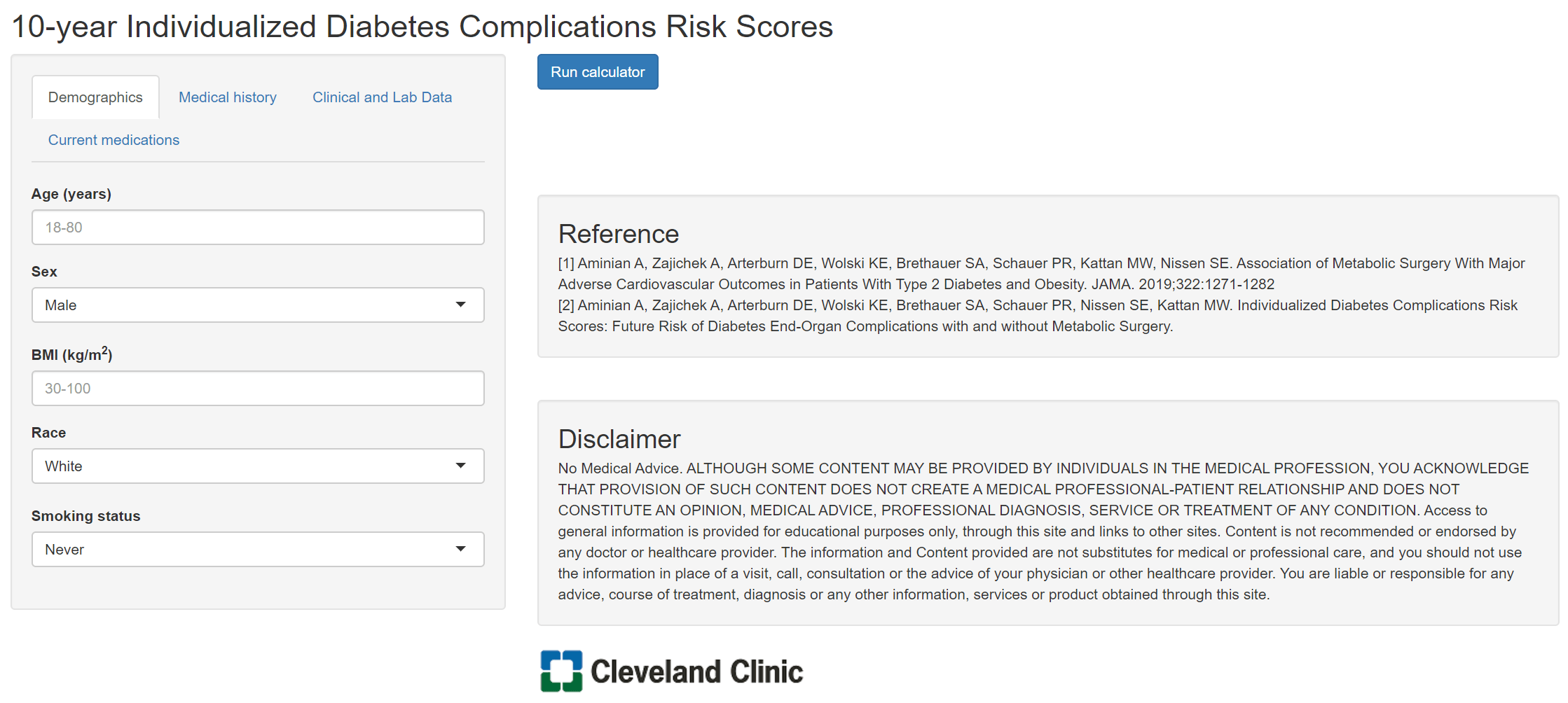
– Cleveland Clinic researchers develop new risk calculator shows patients their risks of developing major health complications over the next 10 years depending on which course of treatment they choose.
– The calculator can be a useful tool for physicians and patients with type 2 diabetes and obesity can can inform patients who are considering weight-loss surgery.
– Calculator shows patient’s risk of heart disease, stroke, heart failure, diabetic kidney disease, and death over the next 10 years with usual care.
Patients struggling with type 2 diabetes and obesity are faced with the decision of whether to receive usual medical care or undergo weight-loss surgery. Now, a new risk calculator developed by Cleveland Clinic researchers can show these patients their risks of developing major health complications over the next 10 years depending on which course of treatment they choose.
10-year Individualized Diabetes Complications Risk Score Calculator Background
Research has shown that weight-loss surgery – also known as metabolic or bariatric surgery – can help people control their diabetes and improve cardiovascular health. In 2016, the world’s leading diabetes organizations recommended in a consensus report that metabolic surgery should be a treatment option for people with type 2 diabetes and obesity. However, few eligible patients undergo the surgery.
To help patients and their physicians better predict the health benefits of usual care versus surgical treatment, Ali Aminian, M.D., a bariatric surgeon at Cleveland Clinic, and his research team developed a risk score calculator that provides personalized evidence-based information, based on a patient’s current health status.
The calculator — 10-year Individualized Diabetes Complications Risk Scores — was developed in two phases over the course of about two years. In the first phase, an observational study looked at nearly 2,300 patients who underwent metabolic surgery and 11,500 matched patients with similar characteristics who received usual medical care.
“The calculator can be a useful tool for physicians and patients with type 2 diabetes and obesity. It shows a patient’s risk of heart disease, stroke, heart failure, diabetic kidney disease, and death over the next 10 years with usual care. It also shows how a patient’s risk of those adverse events could change after metabolic surgery,” said Dr. Aminian, who is also the lead author of the study.
Phase 1 Research Results/Outcomes
This study was partially funded by an unrestricted grant from Medtronic. The phase 1 results, published in the Journal of the American Medical Association (JAMA) in September, show that weight-loss surgery performed in patients with type 2 diabetes and obesity is associated with a 40 percent lower risk of death and major adverse cardiovascular events than usual medical care. Surgical patients also lost more weight had better diabetes control and used fewer medications for treatment of their diabetes and cardiovascular disease than those undergoing usual medical care. Medtronic had no role in the design, conduct of the study, or reporting of the results.
Phase 2 Research
In phase 2, the researchers used the same group of patients to identify predictors for different health outcomes. Evidence-based models were built and integrated into a risk calculator to estimate the likelihood of coronary heart disease, stroke, heart failure, diabetic kidney disease, and mortality over the next 10 years in patients with type 2 diabetes and obesity with and without bariatric surgery.
How to Access Calculator
The calculator will be accessible on the Cleveland Clinic Risk Calculator Library website and as a smartphone application (BariatricCalc). The second version of the app with additional calculators will be released during ObesityWeek 2019.
Impact of Calculator for Physicians & Patients
“Diabetes can be a devastating disease and combined with obesity, patients are at a high risk for cardiovascular complications. Metabolic surgery is an underutilized treatment for these patients. This calculator can help both physicians and patients quantify the risks and benefits of surgery and make the best decision for treatment,” said Steven Nissen, M.D., Chief Academic Officer of the Heart & Vascular Institute at Cleveland Clinic.
